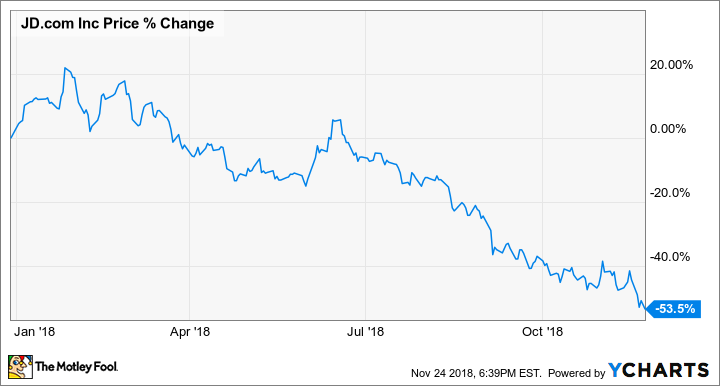2018 has been a trying year for JD.com (JD 2.61%) investors. China's No. 2 e-commerce company came into 2018 on a roll, with the stock rising 63% last year, as excitement seemed to be building for the company's long-term opportunity. JD has been aggressively expanding its network of warehouses and investing in technology such as drone deliveries, robotics, and improved logistics.
However, so far this year, the stock has given up all of those gains and then some. Investors' concerns include a slowdown in the Chinese economy, trade tensions with the U.S., weak profits, and a bizarre incident in which JD CEO Richard Liu was held overnight in Minneapolis on rape allegations.

Image source: JD.com.
The result is that JD.com stock has declined steadily over the course of 2018. The following chart shows how the stock has fallen since the start of the year.
JD.com Year-to-Date Stock Performance, data by YCharts.
Let's take a closer look at the three reasons that explain JD's rough year.
The Chinese sell-off
JD isn't the only Chinese stock to take a dive this year. Alibaba, Tencent, and Baidu are other big-name Chinese companies that have fallen by double digits in 2018, in a sell-off that has intensified over the past six months. Meanwhile, the Shanghai Composite index is down 20%. However, JD has underperformed all of those peers: a sign of the unique challenges the company faces.
Still, there's no question that concerns about the Chinese economy have pushed the stock down. China's economic growth began slowing in May, and GDP growth sank to 6.5% last quarter, the slowest pace since 2009. Slowing retail sales, declining industrial production and investments, and rising default rates have all contributed to the slowdown. So has the simmering trade war with the U.S., which comes as President Trump seeks to make it more expensive for China to export products to the U.S., slapping tariffs on goods such as aluminum and steel. That has also pressured manufacturing in China, weighing on broader economic growth.
JD's business is focused on the Chinese market, so the company isn't directly affected by the tariffs, but weakening economic growth does hurt the e-commerce operator since it depends on Chinese consumers to drive Chinese economic growth. In its most recent quarter, revenue rose 25% year over year, the slowest growth rate of its publicly-traded history.
Slowing profit growth
JD has missed earnings estimates in three of its last four quarterly reports. Through the first three quarters of the year, adjusted earnings per share have fallen to $0.27 from $0.46 a year earlier. Increasing investments in the company's infrastructure -- including its logistics and fulfillment network and new technologies -- more than offset JD's strong revenue growth. Its spending on technology and content has nearly doubled over the past year, making that by far its fastest-growing line item. JD has also expanded its warehouse count from 405 to 550 over the past year. Meanwhile, the company has opened a fully automated warehouse in Shanghai that has just four employees, and it's attracted investments from both Google and Walmart.
While falling profits are certainly a concern, the company should return to profit growth as spending on technology and its warehouse expansion eventually moderate, and as moves to open up its logistics network to third-party shippers begin to pay off.
Liu's arrest
Finally, news of Richard Liu's arrest sent the stock plunging in September. Shares fell 16% over a two-day span after Labor Day weekend as news broke that the company's founder and CEO had been arrested on sexual-misconduct charges in Minnesota. Liu was freed the next day and allowed to return to China, which may indicate that he is no longer a suspect. However, the incident attracted much attention in China, where it turned into a minor scandal. Concern arose about what the company would do without Liu -- who closely controls the board and doesn't even allow them to meet without him -- if he were no longer able to run the company.
The stock has not recovered since the incident, but it's unclear if fears arising from Liu's arrest are still weighing on the share price. The case is still open, and management declined to comment on it in the recent earnings report. Liu's lawyers have said that charges against him are "highly unlikely," according to The Washington Post.
Concerns about Liu's status are likely to hang over the stock, as the company's future would be in doubt without him. However, if the company can survive the challenge, profit growth should eventually return, and the stock could end up looking dirt cheap at today's price in a year or two.






